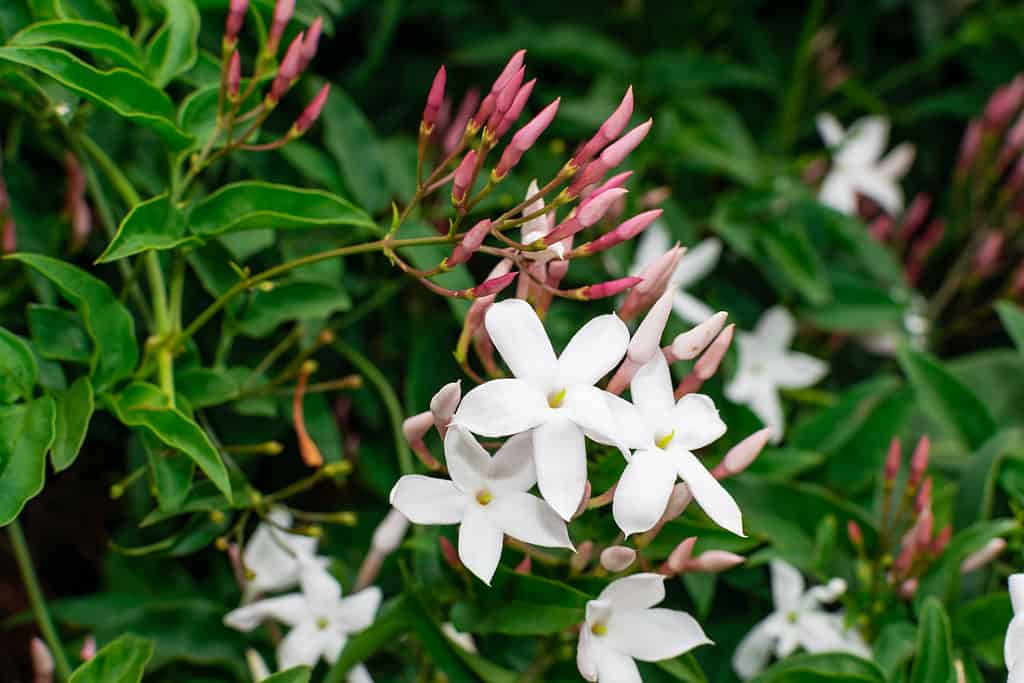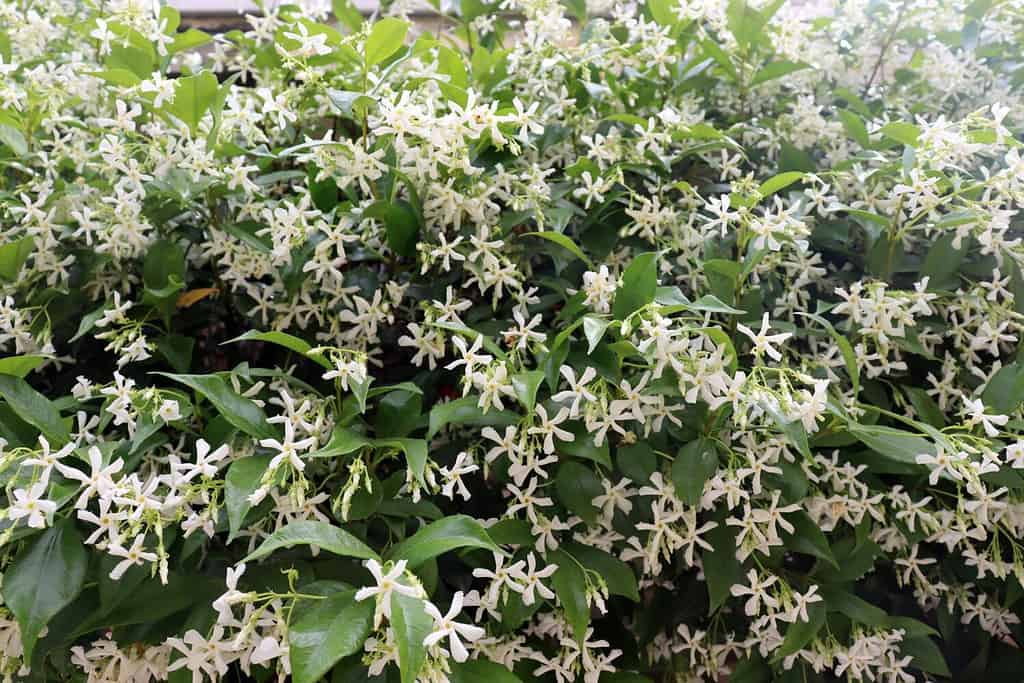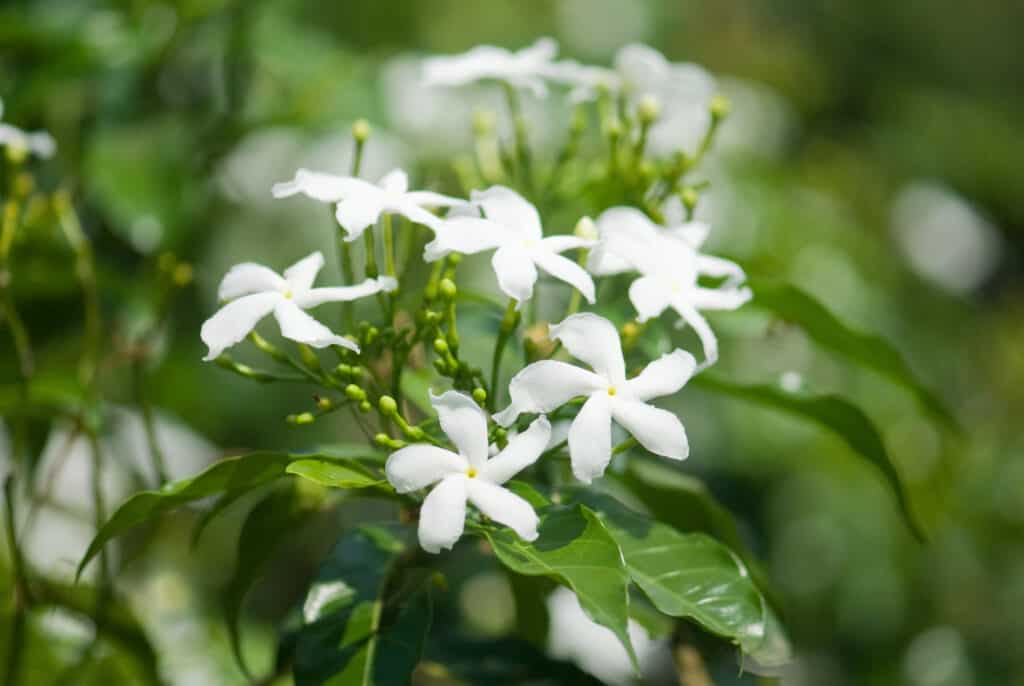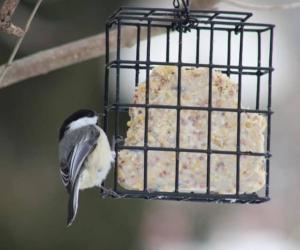Jasmine Flowers: Meaning, Symbolism, and Uses
In the world of blossoms and fragrances, the jasmine flower stands as a timeless emblem of beauty and significance. Its delicate petals and sweet aroma have captivated hearts for centuries, weaving tales of love, spirituality, and cultural heritage.
Jasmine’s allure isn’t merely skin deep. It possesses a profound symbolism that transcends borders and generations, making it a revered flower in various cultures worldwide. In this article, we’ll dive into the rich tapestry of meaning and symbolism behind the jasmine flower.
What are Jasmine Flowers?
A miracle of nature, jasmine blossoms, members of the Jasminum genus, are prized for both their stunning beauty and alluring scent. These flowers have a long history of mesmerizing the senses of people, and they are now an essential component of gardens, fragrances, and cultural traditions all across the world.
Classification
Jasmine flowers belong to the Oleaceae family, which includes approximately 200 species. They are further categorized into the genus Jasminum, where different species and hybrids create a diverse array of jasmine plants. While there are many jasmine species, a few stand out as favorites among gardeners and enthusiasts for their striking features and aromatic blooms.
Appearance
The exquisite and alluring look of jasmine blooms is well known. Typically, they consist of five or more delicate petals that can be either white or pale yellow, although some varieties may exhibit shades of pink or red. These petals form a star-shaped bloom, creating a visually striking and symmetrical display.
Jasmine blooms are also joined by thin, vivid green foliage that provide the blossoms with a lush backdrop. Jasmine is a beautiful addition to gardens and landscapes because of its blend of delicate petals and lush foliage.
Native Regions
Jasmine flowers are native to tropical and subtropical regions across the globe. They thrive in climates characterized by warmth and ample sunlight. Some of the primary regions where jasmine plants are indigenous include:
- Asia: Many species of jasmine, such as Jasminum sambac (Arabian jasmine), originate from Asia. These varieties are often cultivated for their aromatic flowers and hold significant cultural importance, featuring prominently in various ceremonies and traditions.
- Africa: Certain jasmine species are native to African countries, where they flourish in diverse landscapes. African jasmine (Jasminum abyssinicum) is one such species, known for its fragrant blossoms and adaptability to different climates.
- Australia: Native species may be found in Australia, such as Australian jasmine (Jasminum suavissimum). This species is prized for its decorative characteristics as well as its fragrant blossoms, despite not being as well known as some other variants.
- Europe and the Americas: The common jasmine (Jasminum officinale), a native of Europe, has naturalized in several regions of North and South America. These species are valued for their delightfully fragrant blooms and are frequently grown in gardens.
Common Varieties
Jasmine comes in a variety of species and cultivars, and each one is distinguished by its own characteristics and aroma. The following popular varieties of jasmine have captured the interest of both gardeners and flower enthusiasts:
- Arabian Jasmine: This plant is indigenous to Southeast Asia and has tiny, white or light yellow blooms with a strong, sweet scent. It is highly prized for use in perfumery and is important in rituals related to religion and culture.
- Common Jasmine: This European native has white, star-shaped blossoms that have a pleasant, sweet scent. This variety is a favorite choice for adorning trellises and garden walls.
- Star Jasmine: Although not a true jasmine, star jasmine is often referred to as such due to its similar appearance and fragrance. It produces clusters of white, star-shaped flowers and is a popular selection for ground cover or climbing vines.
- Night-Blooming Jasmine: This unique variety is known for its tendency to bloom at night. Its greenish-white flowers emit a powerful, sweet scent that becomes particularly pronounced during the evening hours.

©Martin Leber/Shutterstock.com
What is the Meaning and Symbolism Behind Jasmine Flowers?
Jasmine flowers, with their delicate appearance and enchanting fragrance, hold profound symbolism and meaning in various cultures and contexts worldwide. Beyond their aesthetic appeal, these blossoms are laden with significance, representing a range of emotions, values, and cultural expressions.
Love and Romance
Jasmine flowers are often associated with love and romance. Their sweet and seductive aroma has the power to awaken passion and desire. In many cultures, giving a bouquet of jasmine flowers as a sign of love and devotion is popular. In this situation, flowers function as a traditional romantic gesture, denoting intense affection and admiration for a special someone.
Purity and Innocence
Jasmine blossoms are known for their immaculate white petals, which represent innocence and purity. They are used in marriage rituals throughout many cultures to symbolize the purity of the connection between two people. In order to symbolize the purity of their love and the start of a brand-new, untainted life together, brides may choose to wear jasmine garlands or adorn their hair with jasmine blossoms.
Spirituality and Enlightenment
In many different religious practices and beliefs, jasmine blooms have a spiritual significance. Jasmine is revered in Hinduism and is frequently connected to gods like Lord Vishnu and Goddess Lakshmi. The scent of jasmine is thought to clear the mind, help in meditation, and promote spiritual development and enlightenment.
Hope and Optimism
Jasmine blooms are known as the flower of hope and optimism due to their delicate beauty and resilience in harsh environments. They stand for the belief that beauty and courage may be found despite difficult circumstances. Jasmine exhorts us to maintain our optimism and fortitude in the knowledge that brighter days are still to come.
Femininity and Sensuality
Jasmine blossoms have a strong association with sensuality and femininity. In order to increase beauty and attraction, perfumes and scented oils frequently incorporate the sweet and seductive smell of jasmine. Women will occasionally wear flowers as accessories since they are not only visually appealing but also inspire sentiments of sensuality and confidence.
Motherhood and Fertility
In some cultures, jasmine flowers are associated with motherhood and fertility. The white petals represent the purity of motherhood, while the sweet fragrance is believed to invoke fertility and abundance. Women seeking to conceive may use jasmine as a symbol of their desire for motherhood and their hope for a fruitful future.
Friendship and Gratitude
Jasmine flowers are also used to convey friendship and gratitude. Offering a bouquet of jasmine to a friend is a heartfelt way to express appreciation and the hope for a lasting, cherished bond. It serves as a reminder of the fragrant moments shared and the beauty found in friendship.
Cultural Significance
In many cultures across the world, jasmine is very important. For instance, it is the national flower of Thailand and represents chastity and motherhood. Jasmine is referred to as “sampaguita” in the Philippines and stands for simplicity and humility. This type of flower is widely prized and regarded as a sign of hospitality throughout the Middle East, especially in Syria.
Jasmine blossoms go beyond simple natural beauty with their alluring scent and graceful look. They embody a multitude of meanings and symbols that resonate deeply with human emotions, values, and cultural traditions.

©Finecki/Shutterstock.com
Uses for Jasmine Flowers
Beyond its attraction as a beautiful, fragrant flower, jasmine has a variety of useful and cultural uses. This adaptable plant has been used for millennia for a variety of purposes, including culinary pleasures, herbal medicine, and perfumes.
Perfumery and Aromatherapy
The fundamental element of jasmine’s use in aromatherapy and fragrance is its sweet and exotic scent. Extracted from the blooms, jasmine essential oil is a coveted component in expensive fragrances and fragrant goods. Its alluring scent enhances the depth and attractiveness of fragrances while also promoting emotional balance and relaxation in aromatherapy treatments. Due to its calming effects, the oil is frequently used in massages and stress-relieving procedures.
Culinary Delights
Jasmine makes its way into the kitchen and lends meals its enticing scent. Green tea leaves are infused with jasmine blossoms to create the popular jasmine tea, which is prized for its delicate and aromatic flavor. Jasmine rice is popular in Asian cuisines for its delicately sweet scent and is frequently served with savory dishes. Jasmine flowers are also used as a garnish for a variety of drinks and desserts to lend a touch of class and flavor.
Traditional Medicine
Jasmine has been used for a very long time in conventional medical practices. Its leaves and blooms are said to have therapeutic qualities. Jasmine is used in herbal therapy to treat a variety of illnesses, including depression, anxiety, and digestive problems. In certain cultures, it is also used to treat headaches and encourage sound sleep. Jasmine is a natural choice for herbal teas intended to quiet the mind and body due to its calming properties.
Cosmetics and Skincare
The revitalizing effects of jasmine are used in cosmetics and skincare products by the beauty industry. Jasmine extract is utilized in creams, lotions, and serums because of how well it moisturizes and calms the skin. Jasmine’s abundance in antioxidants aids in preventing environmental damage and early aging of the skin.
Cultural and Religious Significance
Jasmine holds profound cultural and religious significance in various societies. In India, jasmine garlands are offered to deities in temples as a symbol of devotion and purity. Jasmine also plays a prominent role in traditional wedding ceremonies, where it represents the purity and beauty of the bride. In the Middle East, the fragrance of jasmine is associated with hospitality and is often used to welcome guests.
Gardening and Landscaping
Beyond its practical uses, jasmine is a beloved addition to gardens and landscapes worldwide. It is cultivated for its ornamental value, adorning trellises, fences, and arbors with its lush greenery and delicate flowers. Gardeners and landscapers appreciate jasmine for its ability to attract pollinators like bees and butterflies, contributing to the health and vibrancy of ecosystems.

©Tukaram.Karve/Shutterstock.com
Proper Occasions to Give Jasmine Flowers as Gifts
Jasmine flowers make for thoughtful and meaningful gifts on a variety of occasions. Their timeless charm and versatility in conveying emotions have made them a popular choice for expressing sentiments ranging from love and appreciation to sympathy and well-wishing.
Romantic Gestures
Jasmine flowers are quintessential symbols of love and romance. They exude an alluring fragrance that can kindle passion and desire. Consider gifting a bouquet of jasmine flowers on occasions such as anniversaries, Valentine’s Day, or as a surprise “just because” gesture to express your love and devotion. The fragrant jasmine blossoms are a timeless declaration of affection and tenderness.
Weddings and Engagements
Jasmine holds deep cultural significance in weddings and engagement ceremonies. Its pure white petals symbolize the purity of the union between two individuals. Presenting jasmine garlands or bouquets to the bride and groom is a cherished tradition in many cultures. These fragrant flowers are a meaningful way to wish the couple a life filled with love, happiness, and harmony.
Sympathy and Condolences
Jasmine flowers can offer solace and comfort during times of loss and mourning. Their gentle and calming aroma can provide emotional support and condolences to those grieving. Gifting a sympathy bouquet of jasmine flowers is a thoughtful way to express your heartfelt condolences and show empathy to someone who has experienced a loss.
Congratulations and Achievements
When celebrating achievements or milestones, jasmine flowers can serve as a symbol of recognition and pride. Whether it’s a graduation, a promotion, or any significant accomplishment, presenting a bouquet of jasmine blossoms is a way to convey congratulations and best wishes for continued success.
Apologies and Reconciliation
Jasmine flowers can convey a heartfelt apology or an olive branch in times of discord or misunderstanding. The purity associated with jasmine can symbolize your sincerity in seeking reconciliation. Sending a bouquet of jasmine as a gesture of apology can be a thoughtful way to mend relationships and express remorse.
Birthdays and Celebrations
Jasmine flowers are a versatile choice for birthdays and celebrations. Any celebration may benefit from their smell and style, which can lend a touch of class and coziness. Giving a bouquet of jasmine flowers is a wonderful way to express your best wishes and make the occasion unforgettable, whether it’s for a friend’s birthday, a family gathering, or a special event.
Gratitude and Appreciation
Jasmine flowers are a perfect option when you want to thank someone who has made a difference in your life and show your thanks. Their timeless beauty and sweet scent can convey your heartfelt thanks and convey your deep appreciation for the person’s kindness, support, or friendship.
New Beginnings and Housewarmings
Jasmine flowers are often associated with new beginnings and fresh starts. When someone is starting a new chapter in their life, such as relocating to a new home or employment, they make wonderful housewarming presents. Jasmine is a sensible way to commemorate these milestones since it represents optimism, hope, and the prospect of a bright future.
Jasmine flowers, with their rich symbolism and versatility, are suitable for a wide range of occasions. Whether you’re celebrating love, offering condolences, expressing gratitude, or extending congratulations, the fragrance and beauty of jasmine blossoms can convey your sentiments with elegance and grace. By selecting the appropriate occasion and personalizing your gift of jasmine flowers, you can create a lasting impression and touch the hearts of those you care about.









